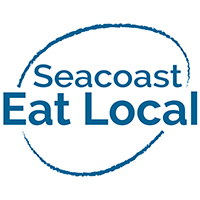As a nutrition major, I am all for buying healthy, nutrient dense foods. However, healthful foods are not necessarily local or sustainable. When I first came to UNH, I was not very aware of how eating locally played a role in nutrition, health or sustainability. However, after taking a few nutrition and sustainability classes I quickly came to realize the benefits of buying my food locally. If you are already reading this blog and attending farmer’s markets weekly, I may be preaching to the choir. But, if you are on the fence about why you should start to invest in local farms, restaurants and stores these are just some of the benefits to eating locally.
- Nutrient Content. When you find produce in big supermarkets, it has often been picked weeks earlier, traveled all the way across the country and waite
 d on store shelves for days before it is bought by you. The longer the time is between the vegetable or fruit being picked to when it lands on your plate, the more nutrients are lost. Therefore, the produce found on farms has a higher nutritional value as it was picked only a couple days or even hours before you buying it.
d on store shelves for days before it is bought by you. The longer the time is between the vegetable or fruit being picked to when it lands on your plate, the more nutrients are lost. Therefore, the produce found on farms has a higher nutritional value as it was picked only a couple days or even hours before you buying it. - Seasonality. Farmers will be selling produce that is in season, as that is what they harvested that day, week, or month. This adds a component of freshness to your food, since your produce did not have to travel from far away. This also means your produce did not have to be artificially ripened or treated to help maintain its freshness.
- Knowledge about the Food. When you buy your food directly from the source (i.e. the farmer) you can learn exactly how your food was grown and harvested. You can ask the farmer whether they follow organic practices, whether their products contain GMOs, the environment their animals are raised in, or whatever other questions you would like to know about the food you are buying from them. The farmer’s, especially at Seacoast Farmer’s Markets, are super friendly and love to talk about their food!
- Environmentally Friendly. Not only does buying local food add to the nutritional value of your produce, but it is also environmentally friendly. Buying food locally helps to support the farmer’s in your community, which in turn helps preserve the farmland and greenery they take care of. Also, with both you and your produce not having to travel as far, you are helping to prevent all the gas emissions associated with traveling in cars and trucks.
- Promotes Food Safety. Buying food directly from the source, limits the steps between the fruit or vegetable being picked to it being bought by you. This helps to prevent possible contamination that could cause a foodborne illness. Similarly, if an outbreak were to occur, it would be much simpler to find the source of the foodborne illness, compared to when food is bought in large grocery stores with hundreds of suppliers.
- Variety. Buying food locally promotes variety in food choice. Farmer’s often grow and sell produce that is not commonly found in the large chain grocery stores. Similarly, you can sign up for a crop share, where the farmer will send you a compilation of the produce they harvested that week, which also adds variety and a sense of surprise to the produce you bring into your home!
- Support the Local Economy. By buying food from your local farmers you are giving your money right back into your community. This helps to support local business, open up more jobs for people in your community and even improve the quality of the farmer’s product. This is an investment that you can benefit from!
- Creates a Sense of Community. Farmer’s markets are a great way not only to meet your local farmers, but also your neighbors and friends. It is place where all people can come together and enjoy what we all have in common: food!
So, come and stop by the farmers market that is closest to you to check out what all the buzz is about with buying and eating local foods!
